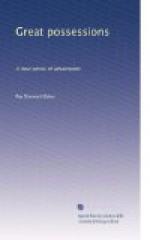The essential taste of the cherry and peach and all their numerous relatives is, in variation, that of the peach pit, so that the whole tribe may be easily recognized, though it was some time before I could tell with certainty the peach from the cherry. The oak shoot, when chewed a little, tastes exactly like the smell of new oak lumber; the maple has a peculiar taste and smell of its own that I can find no comparison for, and the poplar is one of the bitterest trees that ever I have tasted. The trees—pines, spruces, hemlocks, balsams, cedars—are to me about the pleasantest of all, both in taste and odour, and though the spruces and pines taste and smell much alike at first, one soon learns to distinguish them. The elm has a rather agreeable, nondescript, bitterish taste, but the linden is gummy and of a mediocre quality, like the tree itself, which I dislike. Some of the sweetest flowering shrubs, such as the lilac, have the bitterest of leaves and twigs or, like certain kinds of clematis, have a seed that when green is sharper than cayenne pepper, while others, like the rose, are pleasanter in flavour. The ash tree is not too bitter and a little sour.
I give here only a few of the commoner examples, for I wish to make this no tedious catalogue of the flavours of the green people. I am not a scientist, nor would wish to be taken for one. Only last winter I had my pretensions sadly shocked when I tasted twigs cut from various trees and shrubs and tried to identify them by taste or by smell, and while it was a pleasing experiment I found I could not certainly place above half of them; partly, no doubt, because many growing things keep their flavours well wrapped up in winter. No, I have not gone far upon this pleasant road, but neither am I in any great hurry; for there yet remains much time in this and my future lives to conquer the secrets of the earth. I plan to devote at least one entire life to science, and may find I need several!
One great reason why the sense of taste and the sense of smell have not the same honour as the sense of sight or of hearing is that no way has yet been found to make a true art of either. For sight, we have painting, sculpturing, photography, architecture, and the like; and for hearing, music; and for both, poetry and the drama. But the other senses are more purely personal, and have not only been little studied or thought about, but are the ones least developed, and most dimmed and clogged by the customs of our lives.
For the sense of smell we have, indeed, the perfumer’s art, but a poor rudimentary art it is, giving little freedom for the artist who would draw his inspirations freshly from nature. I can, indeed, describe poorly in words the odours of this June morning—the mingled lilacs, late wild cherries, new-broken soil, and the fragrance of the sun on green verdure, for there are here both lyrical and symphonic odours—but how inadequate it is! I can tell you what I feel




